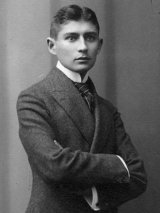Metamorphosis Page #4
The Metamorphosis (German: Die Verwandlung) is a novella written by Franz Kafka which was first published in 1915. One of Kafka's best-known works, The Metamorphosis tells the story of salesman Gregor Samsa who wakes one morning to find himself inexplicably transformed into a huge insect (German ungeheures Ungeziefer, literally "monstrous vermin"), subsequently struggling to adjust to this new condition. The novella has been widely discussed among literary critics, with differing interpretations being offered.
And while Gregor gushed out these words, hardly knowing what he was saying, he made his way over to the chest of drawers - this was easily done, probably because of the practise he had already had in bed - where he now tried to get himself upright. He really did want to open the door, really did want to let them see him and to speak with the chief clerk; the others were being so insistent, and he was curious to learn what they would say when they caught sight of him. If they were shocked then it would no longer be Gregor's responsibility and he could rest. If, however, they took everything calmly he would still have no reason to be upset, and if he hurried he really could be at the station for eight o'clock. The first few times he tried to climb up on the smooth chest of drawers he just slid down again, but he finally gave himself one last swing and stood there upright; the lower part of his body was in serious pain but he no longer gave any attention to it. Now he let himself fall against the back of a nearby chair and held tightly to the edges of it with his little legs. By now he had also calmed down, and kept quiet so that he could listen to what the chief clerk was saying. "Did you understand a word of all that?" the chief clerk asked his parents, "surely he's not trying to make fools of us". "Oh, God!" called his mother, who was already in tears, "he could be seriously ill and we're making him suffer. Grete! Grete!" she then cried. "Mother?" his sister called from the other side. They communicated across Gregor's room. "You'll have to go for the doctor straight away. Gregor is ill. Quick, get the doctor. Did you hear the way Gregor spoke just now?" "That was the voice of an animal", said the chief clerk, with a calmness that was in contrast with his mother's screams. "Anna! Anna!" his father called into the kitchen through the entrance hall, clapping his hands, "get a locksmith here, now!" And the two girls, their skirts swishing, immediately ran out through the hall, wrenching open the front door of the flat as they went. How had his sister managed to get dressed so quickly? There was no sound of the door banging shut again; they must have left it open; people often do in homes where something awful has happened. Gregor, in contrast, had become much calmer. So they couldn't understand his words any more, although they seemed clear enough to him, clearer than before - perhaps his ears had become used to the sound. They had realised, though, that there was something wrong with him, and were ready to help. The first response to his situation had been confident and wise, and that made him feel better. He felt that he had been drawn back in among people, and from the doctor and the locksmith he expected great and surprising achievements - although he did not really distinguish one from the other. Whatever was said next would be crucial, so, in order to make his voice as clear as possible, he coughed a little, but taking care to do this not too loudly as even this might well sound different from the way that a human coughs and he was no longer sure he could judge this for himself. Meanwhile, it had become very quiet in the next room. Perhaps his parents were sat at the table whispering with the chief clerk, or perhaps they were all pressed against the door and listening. Gregor slowly pushed his way over to the door with the chair. Once there he let go of it and threw himself onto the door, holding himself upright against it using the adhesive on the tips of his legs. He rested there a little while to recover from the effort involved and then set himself to the task of turning the key in the lock with his mouth. He seemed, unfortunately, to have no proper teeth - how was he, then, to grasp the key? - but the lack of teeth was, of course, made up for with a very strong jaw; using the jaw, he really was able to start the key turning, ignoring the fact that he must have been causing some kind of damage as a brown fluid came from his mouth, flowed over the key and dripped onto the floor. "Listen", said the chief clerk in the next room, "he's turning the key." Gregor was greatly encouraged by this; but they all should have been calling to him, his father and his mother too: "Well done, Gregor", they should have cried, "keep at it, keep hold of the lock!" And with the idea that they were all excitedly following his efforts, he bit on the key with all his strength, paying no attention to the pain he was causing himself. As the key turned round he turned around the lock with it, only holding himself upright with his mouth, and hung onto the key or pushed it down again with the whole weight of his body as needed. The clear sound of the lock as it snapped back was Gregor's sign that he could break his concentration, and as he regained his breath he said to himself: "So, I didn't need the locksmith after all". Then he lay his head on the handle of the door to open it completely. Because he had to open the door in this way, it was already wide open before he could be seen. He had first to slowly turn himself around one of the double doors, and he had to do it very carefully if he did not want to fall flat on his back before entering the room. He was still occupied with this difficult movement, unable to pay attention to anything else, when he heard the chief clerk exclaim a loud "Oh!", which sounded like the soughing of the wind. Now he also saw him - he was the nearest to the door - his hand pressed against his open mouth and slowly retreating as if driven by a steady and invisible force. Gregor's mother, her hair still dishevelled from bed despite the chief clerk's being there, looked at his father. Then she unfolded her arms, took two steps forward towards Gregor and sank down onto the floor into her skirts that spread themselves out around her as her head disappeared down onto her breast. His father looked hostile, and clenched his fists as if wanting to knock Gregor back into his room. Then he looked uncertainly round the living room, covered his eyes with his hands and wept so that his powerful chest shook. So Gregor did not go into the room, but leant against the inside of the other door which was still held bolted in place. In this way only half of his body could be seen, along with his head above it which he leant over to one side as he peered out at the others. Meanwhile the day had become much lighter; part of the endless, grey-black building on the other side of the street - which was a hospital - could be seen quite clearly with the austere and regular line of windows piercing its facade; the rain was still falling, now throwing down large, individual droplets which hit the ground one at a time. The washing up from breakfast lay on the table; there was so much of it because, for Gregor's father, breakfast was the most important meal of the day and he would stretch it out for several hours as he sat reading a number of different newspapers. On the wall exactly opposite there was photograph of Gregor when he was a lieutenant in the army, his sword in his hand and a carefree smile on his face as he called forth respect for his uniform and bearing. The door to the entrance hall was open and as the front door of the flat was also open he could see onto the landing and the stairs where they began their way down below.
Translation
Translate and read this book in other languages:
Select another language:
- - Select -
- 简体中文 (Chinese - Simplified)
- 繁體中文 (Chinese - Traditional)
- Español (Spanish)
- Esperanto (Esperanto)
- 日本語 (Japanese)
- Português (Portuguese)
- Deutsch (German)
- العربية (Arabic)
- Français (French)
- Русский (Russian)
- ಕನ್ನಡ (Kannada)
- 한국어 (Korean)
- עברית (Hebrew)
- Gaeilge (Irish)
- Українська (Ukrainian)
- اردو (Urdu)
- Magyar (Hungarian)
- मानक हिन्दी (Hindi)
- Indonesia (Indonesian)
- Italiano (Italian)
- தமிழ் (Tamil)
- Türkçe (Turkish)
- తెలుగు (Telugu)
- ภาษาไทย (Thai)
- Tiếng Việt (Vietnamese)
- Čeština (Czech)
- Polski (Polish)
- Bahasa Indonesia (Indonesian)
- Românește (Romanian)
- Nederlands (Dutch)
- Ελληνικά (Greek)
- Latinum (Latin)
- Svenska (Swedish)
- Dansk (Danish)
- Suomi (Finnish)
- فارسی (Persian)
- ייִדיש (Yiddish)
- հայերեն (Armenian)
- Norsk (Norwegian)
- English (English)
Citation
Use the citation below to add this book to your bibliography:
Style:MLAChicagoAPA
"Metamorphosis Books." Literature.com. STANDS4 LLC, 2025. Web. 5 Feb. 2025. <https://www.literature.com/book/metamorphosis_20>.








Discuss this Metamorphosis book with the community:
Report Comment
We're doing our best to make sure our content is useful, accurate and safe.
If by any chance you spot an inappropriate comment while navigating through our website please use this form to let us know, and we'll take care of it shortly.
Attachment
You need to be logged in to favorite.
Log In